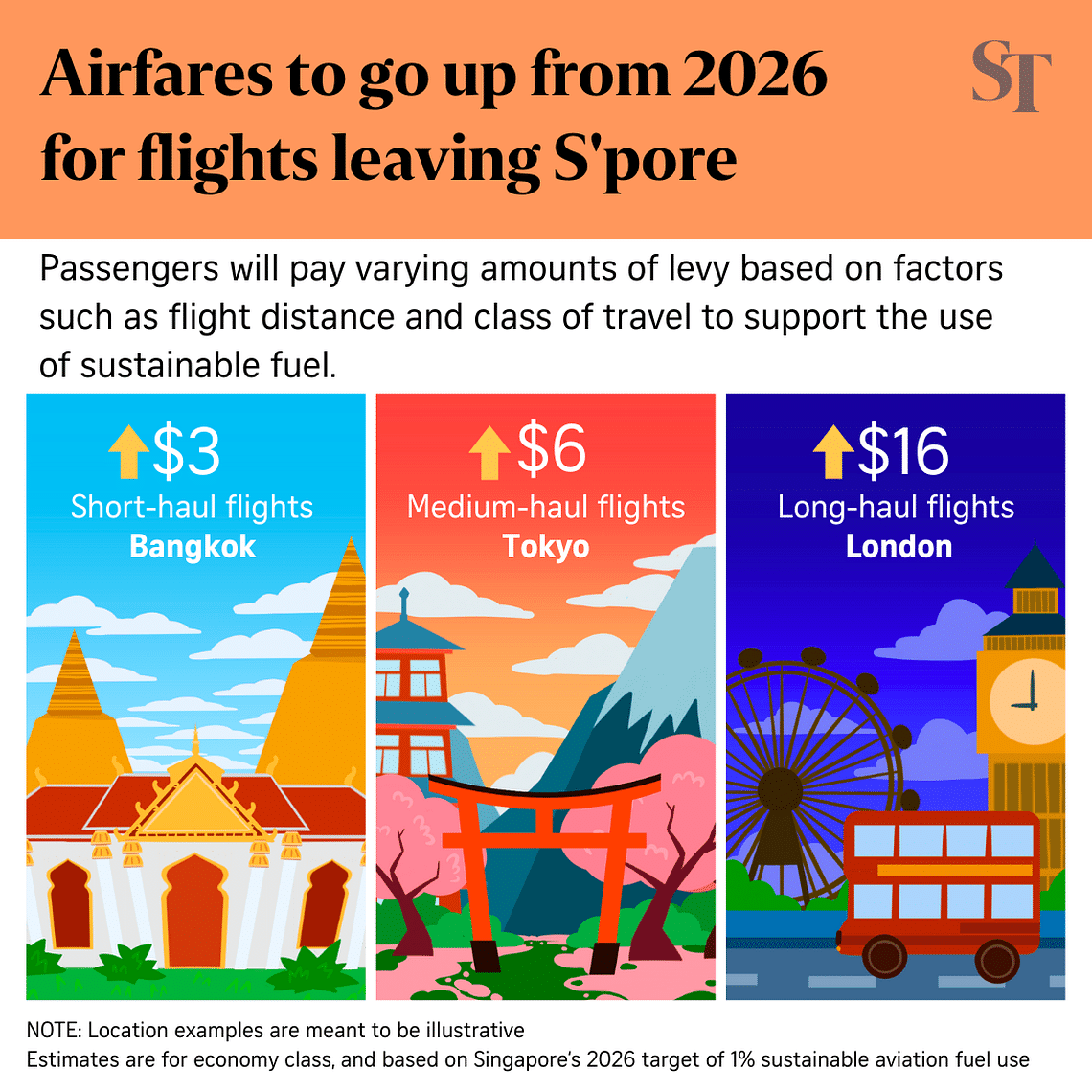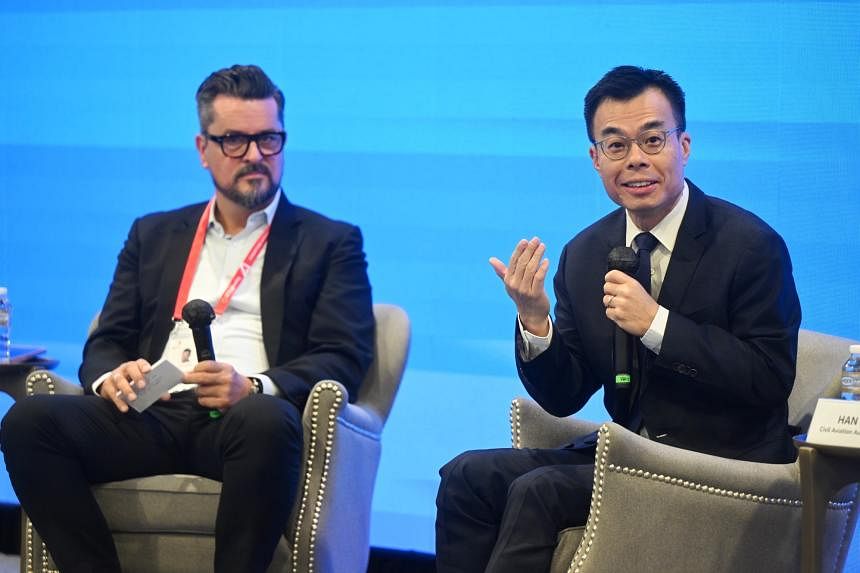SINGAPORE – Singapore’s civil aviation chief said the authorities here have no choice but to require airlines to use green jet fuel despite concerns that a planned levy to be imposed on passengers could result in higher air travel costs and reduce Singapore’s competitiveness as an air hub.
Mr Han Kok Juan, director-general of the Civil Aviation Authority of Singapore (CAAS), said on Feb 20 that the agency has been asked why it wants to mandate eco-friendly fuel use, which would make air travel more expensive and compromise the competitiveness of airlines and the Singapore air hub.
“We have no choice, because if you really think about it... it is really a matter of time that we would have to deploy sustainable aviation fuel in our respective airports,” Mr Han said at a dialogue session at the Singapore Airshow 2024, which runs till Feb 25.
He acknowledged that this will make operating out of the Singapore hub “a bit more expensive”, but Singapore will try to be a lot more competitive and attractive in other ways. He did not elaborate.
The dialogue, attended by about 70 people, including delegates and exhibitors, was moderated by Mr Oliver Plogmann, a partner at management consultancy McKinsey & Company Singapore.
Mr Han was responding to a question from the moderator on how to increase the adoption of eco-friendly jet fuel a day after CAAS launched its sustainable air hub blueprint on Feb 19.
It sets out Singapore’s plan to impose a new green jet fuel levy on travellers departing Singapore from 2026 as flights leaving the city-state will have to use sustainable aviation fuel from that year.
Travellers flying out of Singapore will pay higher airfares because of the levy.
Economy-class passengers will incur an estimated $3 for short-haul flights, $6 for medium-haul flights and $16 for long-haul flights, with passengers in premium classes set to pay more.
The national target is for sustainable fuel to form 1 per cent of all jet fuel used at Changi and Seletar airports in 2026.
The goal is to reach 3 per cent to 5 per cent by 2030.
Mr Han acknowledged that Singapore’s 2026 goal is conservative but a good starting point. “Our view is that it’s useful to make a start. That’s the reason why we have started conservatively at 1 per cent in 2026,” he said.
Time is needed to build an ecosystem for the use of eco-friendly fuel, and to build resilience through increased green fuel production capabilities in Singapore and the region, said Mr Han.
He added that the Feb 19 announcement on the targets and levy is also a “call to action” for industry partners to join hands with CAAS.
When demand for sustainable jet fuel picks up, CAAS wants to ensure that airlines and Singapore’s air hub have access to affordable fuel, said Mr Han.
He noted that fuel is a big part of the operating costs of airlines, which take the procurement and affordability of fuel into consideration in their strategies.
This suggests that Singapore would need to have a deliberate eco-friendly aviation fuel strategy.

Even though the cost of air travel out of Singapore is set to rise, Mr Han said air travel demand remains robust.
Sustainable jet fuel is estimated to account for 65 per cent of the reduction in carbon emissions needed for the aviation industry to achieve net-zero emissions, noted Mr Han.
CAAS will procure eco-friendly aviation fuel centrally, channelling the money collected from the levy to the procurement of fuel, he said.
While the 2026 target may be a small volume, Mr Han noted that central procurement will allow Singapore to reap economies of scale to secure the lowest possible costs for the volume of fuel bought in the initial years.
He added that CAAS is engaging companies in the energy and financial sectors to understand how to adopt green jet fuel in a cost-effective manner.
On keeping fuel costs affordable, Mr Han said the authority will diversify the pool of eco-friendly fuel suppliers it works with and the sources of supply.
CAAS will also have a mix of short-, medium- and long-term contracts with these different suppliers, he noted.
He said it is difficult to set up a viable ecosystem for the use of green jet fuel without a government mandate.
He pointed to inadequate uptake under an earlier trial to supply Singapore Airlines (SIA) and Scoot flights departing Changi Airport with a more eco-friendly blend of jet fuel.
In the trial by CAAS, SIA and Temasek-owned investment platform GenZero, about two-thirds of the 1,000 credits generated from SIA’s purchase of 1,000 tonnes of sustainable jet fuel were sold to customers. Each of the 1,000 credits represents a reduction of 2.5 tonnes of carbon dioxide emissions, thus corresponding to about 2,500 tonnes of reductions in all.
Mr Han said: “If you leave it to the passengers, it’s going to be very difficult. So some kind of mandate is necessary if we want to move on sustainable aviation fuel in a meaningful way.”
The remaining 35 per cent of the projected reduction in carbon emissions will be achieved through improvements in air traffic management, the roll-out of solar panels and other steps.
Singapore’s approach in adopting sustainable fuel was also brought up at a forum of top aviation executives at the air show on Jan 20. The moderator, Mr Graham Dunn, head of content at aviation publication FlightGlobal, posed questions about sustainability to the panellists.
Mr Peter Bellew, chief operating officer of the Saudi Arabia-based Riyadh Air, which is slated to begin operations in 2025, said it is crucial to develop alternative technologies that can promote sustainability in the aviation industry.
If this is not taken seriously, “we will have regulations forced to fund the incompetence of the industry”, he said.
A more immediate remedy is to focus on air traffic management, said Mr Bellew, who added that airlines generally fly 12 per cent more than they need to because of how air traffic is being directed.
By investing in air traffic controllers – a relatively smaller sum than channelling funds into new technologies – carbon emissions can be lowered if airlines fly more efficiently, he added.
The 2024 edition of the biennial Singapore Airshow is the first full-scale one in six years.
It is expected to draw some 50,000 trade attendees and more than 60,000 public visitors.
- Additional reporting by Aqil Hamzah

